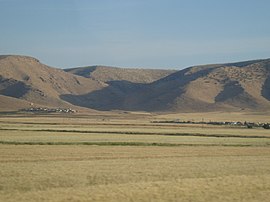Tepeüstü (Kurdish: Tilminar; Syriac: Tel-Manar)[nb 1] is a neighbourhood in the municipality and district of Nusaybin, Mardin Province in Turkey.[3] The village is populated by Kurds of the Kasikan tribe and had a population of 1,269 in 2021.[1][4]
Tepeüstü | |
|---|---|
 Outskirts of the village | |
| Coordinates: 37°06′47″N 41°22′55″E / 37.113°N 41.382°E | |
| Country | Turkey |
| Province | Mardin |
| District | Nusaybin |
| Population (2021)[1] | 1,269 |
| Time zone | UTC+3 (TRT) |
History
editTel-Manar (today called Tepeüstü) was historically inhabited by Syriac Orthodox Assyrians.[5] In 1914, it was populated by 150 Assyrians, as per the list presented to the Paris Peace Conference by the Assyro-Chaldean delegation.[6] There were ten Assyrian families in 1915.[7] Amidst the Sayfo, the Assyrians took refuge at Mharkan, where they were then killed by Yusuf Hajo.[8] By 1987, there were no remaining Assyrians.[7]
References
editNotes
Citations
- ^ a b "31 ARALIK 2021 TARİHLİ ADRESE DAYALI NÜFUS KAYIT SİSTEMİ (ADNKS) SONUÇLARI" (XLS). TÜİK (in Turkish). Retrieved 16 December 2022.
- ^ Jongerden & Verheij (2012), p. 325; Courtois (2004), p. 225.
- ^ Mahalle, Turkey Civil Administration Departments Inventory. Retrieved 19 September 2023.
- ^ Tan (2018), p. 167.
- ^ Jongerden & Verheij (2012), p. 326.
- ^ Gaunt (2006), p. 425.
- ^ a b Courtois (2004), p. 225.
- ^ Gaunt (2006), p. 264.
Bibliography
edit- Courtois, Sébastien de (2004). The Forgotten Genocide: Eastern Christians, The Last Arameans. Translated by Vincent Aurora. Gorgias Press.
- Gaunt, David (2006). Massacres, Resistance, Protectors: Muslim-Christian Relations in Eastern Anatolia during World War I. Gorgias Press. Retrieved 21 May 2023.
- Jongerden, Joost; Verheij, Jelle (2012). Social Relations in Ottoman Diyarbekir, 1870-1915. Brill.
- Tan, Altan (2018). Turabidin'den Berriye'ye. Aşiretler - Dinler - Diller - Kültürler (in Turkish). Pak Ajans Yayincilik Turizm Ve Diş Ticaret Limited şirketi. ISBN 9789944360944.
